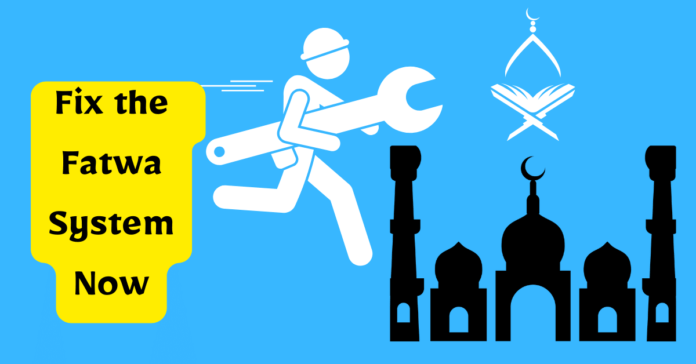The fatwa is again grabbing headlines of the mainstream media. This time the fatwas issued was against Imam Umer Ahmed Ilyasi who is the chief of the All-India Imam Organization, for attending the Pran Pratishtha ceremony, of the under-construction Ram temple in Ayodhya on 22 January. The ceremony marked the inauguration of the controversial new Hindu temple on the site of the demolished Babri Masjid. This latest controversial fatwa highlights a growing problem – the current fatwa anarchy that is fueling prejudice, not piety.
The media frenzy for fatwas
After shuffling through the news of several media organizations, Initially, I could not find what was the content or fatwa about? Of this news which most media organizations reported with sensational headings, the emphasis was that after the issuance of the Fatwa he received life threating messages and phones calls. After a 20 minutes search on the internet, I finally found that the fatwa was about declaring him ‘kafir’ which did not find mention in any headlines.So, merely, mentioning the word fatwa is enough to communicate to the readers that it is bad and implant a picture of violence in the mind.
As per the news reported by India Today, the fatwa was issued by Mufti Sabir Hussaini who runs an organization named ‘Mufti Classes’. In my entire life I never heard of this organization and I am confident that most Indian Muslims do not know about this organization. But the coverage in the media was as if a mainstream organization having credibility among Muslims issued the Fatwa. Nonetheless, the fatwa issued was outrageous and reactionary following no established procedure in Islamic Jurisprudence. It was clearly aimed at grabbing media attention which it did successfully.
However, without discussing the scandalous nature of this Fatwa, I argue in this article that even the credible, mainstream current fatwa system is outdated and divisive in the contemporary India. It needs reform. It is nearly impossible and undesirable to develop a uniform fatwa system given the diversity of the Muslim community divided on the lines of different school of thoughts. But they need to at least develop a common minimum understanding around the contemporary modern challenges and issues being faced by the Indian Muslim community at large. The fatwas issued by Grand bodies of all India nature should be oriented towards achieving a more just, equal and egalitarian society than establishing the supremacy of their particular school of thought or Imam bickering around issues of no relevance. They should be mindful of their immediate socio-political location. The Maslaki issues and their resolution should be left to community Muftis which they doing already.
Missing Rigor and Nuance
The present system of issuing fatwas tends to directly feed into negative stereotypes of entire Muslim community of them being outdated, obsolete and opposed to modern values of justice, freedom and equality. For fatwas to play a constructive role in modern India, the process needs to be reformed with greater oversight, accountability, involvement of representative bodies, and a return to nuanced, scholarly deliberations that advance social harmony. Unregulated fatwas that aggravate tensions between communities or demonize differences of opinion should have no place in any society including India. Reform is critical to restore the constructive purpose of fatwas and strengthen, not weaken, Indian Muslim society.
The fatwa system in India today has sadly deviated greatly from its original purpose that was to offer scholarly advice to Muslims on mostly religious matters. In the past, fatwas were often result of careful consultation and deliberation by panels of experts following a rigorous process of reasoning and consensus building. However, the current system has established no form of regulation or accountability in the face of rapid advancement in communication technology with demonstrated potential to manipulate every form of communication with nefarious objectives. As a result, no matter the merit of each fatwas ,they have been simply reduced to reactive soundbites and impulsive statements. The Maulanas often in collusion with political parties have used it frequently for their narrow interests.
There are many recent examples of dubious fatwas being issued rapidly in response to hostile political events or provocative statements, without showing erudition or research. The fatwa against Dr. Ilyasi for attending the Ram temple ceremony is a case in point. It seems to be a reactionary and knee-jerk attempt to grab headlines by condemning a member of the community rather than a scholarly appraisal of theological principles. Such fatwas have become abound in recent times. These actions include prohibiting women from entering mosques, working with men, or wearing jeans, targeting individuals and issuing rapid fatwas against purported deviant Muslims. Clearly, the deliberative rigor and nuance of the past is wholly missing.
It is evident that the unregulated fatwa system has encouraged incentives for attention-seeking hardliners to issue provocative opinions contradicting common sense. The media eagerly reports on such fatwas due to their sensationalist and Islamophobic nature, magnifying the most extreme voices of the community. This has formed a false impression of Indian Muslims as being irrational and backward in their outlook. The absence of erudite and moderate scholarship has greatly harmed the community giving ample opportunities to hardliners to score political points. The fatwas it seems has become an instant tool of getting fame and score a political point against the hardliners of the other religious communities. I am not suggesting to suppress fatwas as it have an important role and place in Islamic theology, but it is an urgent need to reform the system to ensure fatwas once again become instruments of knowledge rather than ignorance and division.
Urgent Reform
The fatwa system in India needs to be overhauled urgently in order to fulfil its purpose as a source of wise religious as well temporal guidance. Leaving the status quo intact is simply not an option. The existing system is inflicting too much harm to the Muslim community in innumerable ways.
At an individual level, Muslims are being misled by fatwas lacking scholarly basis, which in turn create confusion about Islamic practices. At the same time, the proliferation of extreme fatwas paints the entire community as backward and bigoted to outsiders. These fuels the flames of hatred and prejudice already rooted against Muslims, making harmonious coexistence between communities harder.
Muslim community needs to ensure to take measures and institute Mechanisms that allow only qualified experts issue fatwas after deliberation. For start, inclusion of diverse schools of thoughts will ensure a check on unregulated whimsical fatwas. Regulation will also help to focus fatwas on providing guidance to Muslims facing modern challenges, not chasing cheap political gains.
The cost of doing nothing about fatwa reform is too dire. The current system on the one hand deepens divisions within the Muslim community, while on the other, it widens the gap of distrust Muslims face from other communities.




